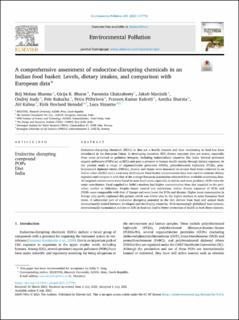A comprehensive assessment of endocrine-disrupting chemicals in an Indian food basket: Levels, dietary intakes, and comparison with European data
Sharma, Brij Mohan; Bharat, Girija K.; Chakraborty, Paromita; Martiník, Jakub; Audy, Ondřej; Kukučka, Petr; Přibylová, Petra; Kukreti, Praveen Kumar; Sharma, Anežka; Kalina, Jiří; Steindal, Eirik Hovland; Nizzetto, Luca
Peer reviewed, Journal article
Published version
Permanent lenke
https://hdl.handle.net/11250/2774851Utgivelsesdato
2021Metadata
Vis full innførselSamlinger
Sammendrag
Endocrine-disrupting chemicals (EDCs) in diet are a health concern and their monitoring in food has been introduced in the European Union. In developing countries, EDC dietary exposure data are scarce, especially from areas perceived as pollution hotspots, including industrialized countries like India. Several persistent organic pollutants (POPs) act as EDCs and pose a pressure to human health mainly through dietary exposure. In the present study a range of organochlorine pesticides (OCPs), polychlorinated biphenyls (PCBs), polybrominated diphenyl ethers (PBDEs), dioxins and furans were measured in several food items collected in an Indian urban (Delhi) and a rural area (Dehradun). Food basket contamination data were used to estimate dietary exposure and compare it with that of the average European population estimated from available monitoring data. All targeted contaminants were found in most food items, especially in dairies and meat products. OCPs were the main contributors. Food supplied to Delhi's markets had higher contamination than that supplied to the peri-urban market in Dehradun. Despite looser control and restrictions, Indian dietary exposure of OCPs and PBDEs were comparable with that of Europe and were lower for PCBs and dioxins. Higher meat consumption in Europe only partly explained this pattern which was driven also by the higher residues in some European food items. A substantial part of endocrine disrupting potential in the diet derives from food and animal feeds internationally traded between developed and developing countries. With increasingly globalized food systems, internationally harmonized policies on EDC in food can lead to better protection of health in both these contexts.
